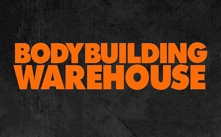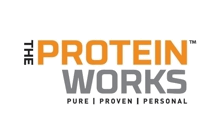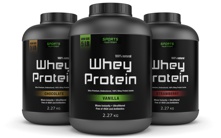 Protein supplements aren’t solely reserved for the muscular body-builder crowd at the gym – protein is also a great way to lose some unwanted fat and preserve your muscles. Additional benefits of protein include: reducing hunger, increasing your muscle strength, fighting off cancer, making your immune system stronger, as well as helping to cope with stress. With that said, the best place to stock up on whey protein and protein supplements is online where you’ll find plenty of great protein deals on offer.
Protein supplements aren’t solely reserved for the muscular body-builder crowd at the gym – protein is also a great way to lose some unwanted fat and preserve your muscles. Additional benefits of protein include: reducing hunger, increasing your muscle strength, fighting off cancer, making your immune system stronger, as well as helping to cope with stress. With that said, the best place to stock up on whey protein and protein supplements is online where you’ll find plenty of great protein deals on offer.
See Also: Fitness Trackers | Smart Watches | Fitbit | Apple Watch
Shops With Protein & Supplement Offers
Protein Buying Guide
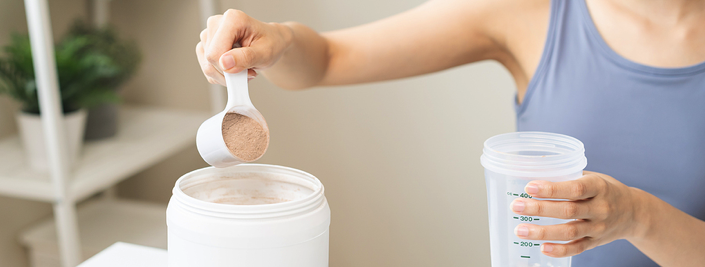
For some there’s an assumption that protein is a supplement for the gym bunny, that it’s the kind of thing that is reserved for Arnold Schwarzenegger and his muscle-bound buddies who want to get arms like tree trunks.
The reality is, though, that protein can be an extremely useful supplement for anybody that wants an alternative healthy breakfast or snack. Protein does work best when it’s used hand-in-hand with a calorie controlled diet and exercise, but it isn’t necessarily exclusive.
Protein can aid fat loss as it supresses appetites and can keep hunger at bay. It also reduces the body’s ability to store fat as it controls blood sugar and insulin levels. Protein also burns up to 35% of its own calories during digestion, which is a huge advantage over carbs and fats as they don’t burn much of themselves at all.
There are literally hundreds of various makers of protein supplements, so we’re not going to be looking at individual brands here. Instead we’re going to explore what protein is, the different forms it comes in and they ways it can benefit you.
What Is Protein?
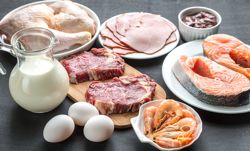 There are some macronutrients that are found in certain foods, like meat, dairy, beans, nuts and so on. Protein is one such macronutrient. It is made up of nine essential amino acids that can help to promote healthy skin, good hair, strong bones, nicer fingernails and, of course, developed muscles.
There are some macronutrients that are found in certain foods, like meat, dairy, beans, nuts and so on. Protein is one such macronutrient. It is made up of nine essential amino acids that can help to promote healthy skin, good hair, strong bones, nicer fingernails and, of course, developed muscles.
It is generally accepted that the best way to get the majority of our protein is through whole foods – eggs, steak, milk etc. – but protein supplements can help people to get those essential amino acids without cooking up a huge meal. You may well have heard of people taking meal replacement shakes, for example, and protein is a major part of that.
The majority of protein supplements are “complete”, which is to say that they contain all nine of the essential amino acids that the body can’t produce itself and therefore needs to get from alternative sources. These are, histidine, isoleucine, leucine, lysine, methionine, phenylalanine, threonine, tryptophan, and valine. Some supplements are “incomplete”, which means they only contain some of the essential amino acids. This is something you should bear in mind when you go shopping.
Another thing to consider is whether you want to look at protein concentrate or isolate. Protein is gained by removing the non-protein parts from food sources. This leaves a concentrate that is a powder, which is 75-80% protein. The remaining percentage is made up of carbohydrates and fat. Isolation is the next step along, removing much more of the non-protein ingredients. Isolate tends to be in the region of 95% pure protein.
Now that we know roughly what we’re talking about when we discuss “protein”, let’s have a look at the different types of protein available and what it all means for you.
The Different Types of Protein
Whey Protein Blend
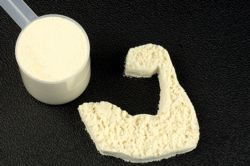 As the name suggests, this product is a blend of whey concentrate with some other types of protein. Both the quality and purity of this can differ wildly, so make sure you have a look at the ingredients if you want to go down this road.
As the name suggests, this product is a blend of whey concentrate with some other types of protein. Both the quality and purity of this can differ wildly, so make sure you have a look at the ingredients if you want to go down this road.
Studies suggest that whey protein can promote the growth of lean muscle, encourage fat loss and act as an appetite suppressant. On top of that it can support your cardiovascular health and a strong metabolism.
Whey blends are less expensive as they are not as pure and therefore are often higher in in sugar, fat and carbs. Depending on your stomach sensitivity and whether or not you’re lactose intolerant, whey blends can cause you some digestive issues.
Whey blend is a good all-rounder for those on a budget, or not convinced that the more expensive varieties will make much of a difference for you. It is a versatile, use whenever you want to type of protein, and is great for people that want to inject a little bit more protein into their life but aren’t married to the idea of taking a supplement everyday. It can be a good meal replacement.
Whey Isolate
As we said earlier, whey isolate is the next step along the road in the process, and it is a purer form of protein than its blended counterpart. It is quicker to digest and, because it’s purer, it’s got much less sugar, fat and carbs in it. It also doesn’t have any lactose in it, so the stomach problems that some people may suffer from with whey blend are less common.
Because of the purification process whey isolate is more expensive than whey blend. It is more in the realm of the sort of thing that weight lifters and body builders might want to use. It tends to maximize muscle growth and aid in your recovery. It’s good for people on a low or no carb diet.
If you are likely to use your protein supplements rarely, or you don’t tend to suffer from stomach problems, then it is likely you won’t necessarily notice the difference between isolated and blended protein. At least you probably won’t know the difference enough to make it worthwhile paying the extra money for the isolated variety.
Sustained Release Blends
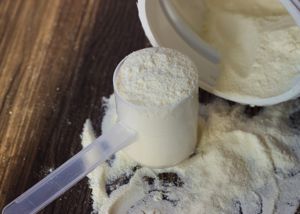 Some proteins are better suited to being meal replacements, and sustained release blends fall into that category. They are a mix of fast and slow digesting proteins that are released into the body over a longer period of time in order to provide a stream of amino acids to the muscles throughout the day.
Some proteins are better suited to being meal replacements, and sustained release blends fall into that category. They are a mix of fast and slow digesting proteins that are released into the body over a longer period of time in order to provide a stream of amino acids to the muscles throughout the day.
Sustained release blends tend to be higher in calories and have some added fats – not all of which are healthy. They are the best way of getting rid of hunger pains. For that reason they really are the best type of protein for people who are looking to replace one of their meals with a shake rather than eat unhealthy food.
Plant Based Blends
Natural blends tend to be made up of different natural proteins, such as brown rice, pea, soy and so on. They don’t have any milk or dairy content, so they are the right type of protein for vegans or vegetarians. As they tend to be made from all natural ingredients they normally don’t have any artificial ingredients or sweeteners in them.
Owing to the fact that they have such specific ingredients in them, and the market place isn’t a particularly busy or popular one, plant based blends are much more expensive than the others – especially when compared to the basic whey blend protein.
Casein Protein
Casein Protein is, like whey, a dairy based protein. It is produced by applying a separation process to liquid milk that can concentrate or isolate the milk protein from fats and carbs.
It is different from whey protein in that it has an alternative release process. It digests over a longer period of time, meaning that it is an ideal protein to take before you go to bed.
The fact that it is dairy based, however, means that some of those digestive issues you may have found with whey blend will still exist here, too. Because it absorbs so slowly it’s not the ideal protein for those looking to ingest something after exercise. The body needs nutrients to replenish itself immediately after exercise, but the slow release of casein doesn’t allow for that. It’s also more expensive than whey, so it’s not ideal for those on a budget.
Egg Protein
We now enter the world of more and more bizarre protein varieties. Egg protein is made by separating the yolk from the egg white and then dehydrating the latter.
The good news is that because it comes from egg it is rich in vitamins and minerals as well as the protein itself. This can help to contribute towards a healthier diet.
The bad news is that it is one of the most expensive proteins on the market. On top of that, plenty of people have allergies to egg in a similar way to dairy, so it isn’t an ideal way to get your protein if you’re not sure of whether you’ll have a reaction to it.
Soy Protein
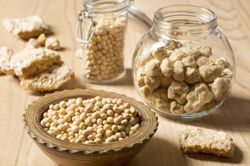 Continuing with the ingredient specific variety of natural proteins, soy is one of the only plant protein sources that offer all of the essential amino acids. The protein comes from the soybeans after they have been dried into soy flour. It can be concentrated or isolated.
Continuing with the ingredient specific variety of natural proteins, soy is one of the only plant protein sources that offer all of the essential amino acids. The protein comes from the soybeans after they have been dried into soy flour. It can be concentrated or isolated.
Soy bean protein can help to improve your body’s bone health and your immune function. Because of this it can aid in the prevention of cardiovascular disease and reduce the risk of some cancers.
On the flip side, soy is often modified in order to be able to produce a larger crop yield. There are also suggestions that soy can have an effect on hormone levels. On top of that, plenty of foods already contain soy owing to the fact that its protein is cheaper. Is it wise to add more soy to an already saturated diet? Possibly not.
Rice Protein
Many people think of rice as being simply a carbohydrate, but brown rice is a good source of protein too. Brown rice is also a great source of complex carbohydrates, fiber and vitamin B. On top of that, it’s hypoallergenic, meaning it is easier to digest.
Unlike soy protein, however, rice doesn’t feature all of the essential amino acids that your body needs, so it’s not a one stop shop for that particular issue. For that reason, it can’t be your only choice of dietary protein.
Hemp Protein
No longer the sole property of hippies and dreadlocked students, hemp is a complex protein as it contains all 21 amino acids, not just the essential few. It is vegan friendly and even more hypoallergenic than brown rice, so it’s ideal for anyone with digestive issues.
If you think it has something to do with cannabis, you’d be right. It is derived from the seeds of the cannabis plant, though it is strictly a food supplement before you ask! Because it is only produced in mass quantity in selected countries it is up there with casein as one of the most expensive forms of protein.
Pea Protein
Nope, we’re not kidding. Pea protein comes from the yellow split pea and is often the protein choice of vegans and vegetarians alike. Much like rice and hemp it is hypoallergenic, so works for those with any digestive issues. It has few added ingredients and is the one you should choose if you’re looking for a protein source as close to a whole food as possible.
This is another protein source that can be considered to be complete, but it doesn’t always contain all of the necessary amino acids, so don’t think of this as a sole source of your dietary protein.
Weight Gainer
If you’re trying to use protein as a meal replacement then for the love of everything dear to you, don’t pick up a weight gainer by accident. This is the choice for those of you that are hoping to bulk up, not slim down. It combines protein – normally whey – with certain high carbohydrate ingredients, making it much more calorie heavy than normal protein powders.
Weight gainers are used by body builders or athletes who do so much exercise they burn through their calorie intake. It allows people to take on more calories than they could manage through food alone, and it will also keep your shopping bill down as you won’t have to buy hundreds of pounds worth of food when you hit the supermarket!
The downside to all of those additional calories is that often come via additives, artificial sweeteners and various other fillers that aren’t always of the healthiest variety. It is also worth bearing in mind that if you aren’t working out as much as you think you are, or if the body decides it doesn’t need all of those extra calories, then they will be stored in the body as fat rather than converted to muscle.
How to Select a Protein
 Protein wise there really is something suitable for everyone, and if you type “protein powder” into one of the online shopping websites, such as Amazon, you’ll get over 15,000 results. This can be a blessing in disguise as the options are varied, but often too much choice isn’t necessarily a good thing.
Protein wise there really is something suitable for everyone, and if you type “protein powder” into one of the online shopping websites, such as Amazon, you’ll get over 15,000 results. This can be a blessing in disguise as the options are varied, but often too much choice isn’t necessarily a good thing.
Apart from with offers and deals there isn’t really a great way to get value out of protein powders, which is to say that you tend to get what you pay for. The cheaper the price of the protein, the more likely it is that it will be made of a blend of ingredients that won’t necessarily be easy or healthy to digest, so if you see a good quality protein on offer than snap it up as soon as you can.
You should also bear in mind that numerous things will affect the amount of protein your body needs. How often do you exercise? What form does that exercise take? What’s your physical shape, are you large, small, thin, fat, tall small and, so on? Plus, the obvious one, are you male or female? Sometimes trying numerous different proteins will allow you to figure out which one is the right one for you.
Finally, remember that the clue is in the title. Protein is a supplement. It should supplement your normal diet, not replace it completely. Just because you get your essential amino acids from complete varieties of protein, there are plenty of things your body needs that a protein shake won’t provide it with. Keep that in mind when you are planning how to fit protein supplements into your daily life.


